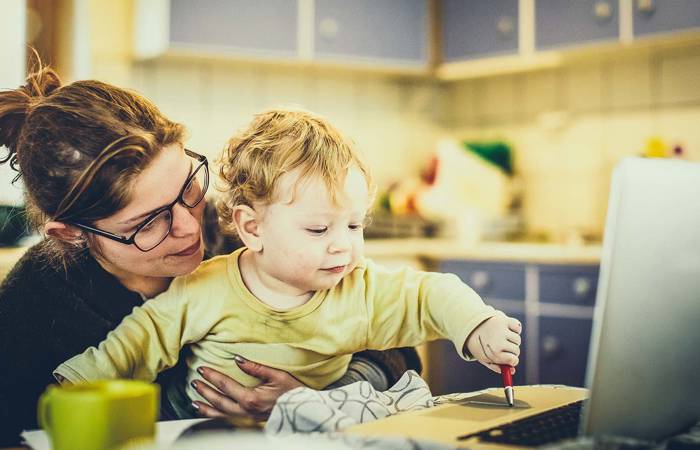Like what you see?
Sign up to receive more free parenting advice.
Thank you for subscribing to our newsletter!
Lifestyle

Credit: iStock.com/MangoStar_Studio
If there’s one word that sums up how many parents feel about parenting it’s “exhausting". But what happens when parents are simply doing too much and that exhaustion leads to burnout?
According to research published in Clinical Psychological Science, a journal of the Association for Psychological Science, parental burnout can have a huge impact on the lives of both parent and child, including at its most extreme - parental neglect, harm and thoughts of abandonment.
However, results suggest there are important lessons to be learned when it comes to parental wellbeing and the importance of parents asking for support.
Lead researcher Moïra Mikolajczak of UCLouvain studied the outcomes associated with parental burnout in two studies that followed parents over time. The parents completed three online surveys spaced about five months apart, looking at their emotional exhaustion, emotional distancing, and feelings of inefficacy.
Overall, the data suggests that parental burnout is likely the cause of escape ideation, parental neglect and parental violence. The researchers claim additional studies are needed to confirm and extend these findings with broader samples and measures. But the results suggest there are vital lessons about parental wellbeing and the value of support.
Extra pressures of modern society
Professor Catherine McMahon, Centre for Emotional Health, Psychology Department at Macquarie university believes being a parent has always been a hard job, but today there are extra pressures.
“These days there are pressures involved that are beyond what there used to be because of today’s constant work/family juggle. All the things parents have always had to do for their children haven’t gone away, but today there are a whole lot of other things that have been added on top of the workload,” Professor McMahon said.
“For many parents, children have become a project that has to be managed and parents feel like they have to be everything, from best friend, to companion, to taxi driver, organiser of extracurricular activities and the provider of endless opportunities.
“I think parents always knew what their job was without having to add all those extra jobs, which makes life even more exhausting than it used to be.
“Especially now people are getting older when they’re having children, and their own parents are older, so there are many parents who are having to help contribute to care for elderly parents. I think there’s also less extended family support available to parents now and that adds to the burnout.”
For many parents, children have become a project that has to be managed and parents feel like they have to be everything, from best friend, to companion, to taxi driver, organiser of extracurricular activities and the provider of endless opportunities.Professor Catherine McMahon
Stay up to date with the latest news and articles from First Five Years
Thank you for subscribing to our newsletter!
Parents need to prioritise
According to Professor McMahon, parents need to practice self-care because, if they get tired and irritable, they can’t be an ideal support for their children.
“Parents need to prioritise, which is easier said than done, but they need to think about what’s really important to the children; what really needs to be done and what can be delegated.
“If you can really drill down what children remember about their parents it’s that the parent was there for them when they were afraid or sick, and that they were able to delight in their achievements. Those are important things to focus on.”
Professor McMahon believes independence is something that some parents really struggle with – they feel they have to micro-manage every aspect of their child’s life.
“Those parents really need to re-think some of that and find ways to allow the children to have more unstructured time. It’s a kind of ‘hyper mothering’ where many mothers are trying to be perfect.”
No parent can really be perfect
The research by Moïra Mikolajczak also highlighted the idea that many parents are trying to be perfect, when no parent can really be perfect. That search for perfection leads to exhaustion.
Instead, parents need to find ways to look after themselves in ways that recharge their batteries, finding time for themselves, a hobby or simply going for a walk.
Rebekah, a 42-year-old Sydney mother of children, aged two and four, says she feels incredibly burnt out because she believes she tries to do “too much”.
“It feels like everyone else is juggling multiple things and managing to cope. So I try to do everything at once and don’t realise I’m not coping until I start crying over the slightest thing, or just collapse in a heap at the end of the day,” Rebekah says.
“My partner works long hours and isn’t around to help me during the week. And the only time I ever reach out for help is when I ask my sister to bring her kids over to my house, so my kids can play with her kids and we can talk and relax for a couple of hours. But, apart from that, I feel like I’m very much on my own when it comes to looking after the kids and doing everything I think I should be doing for them.
“I know something’s got to give, but I’m not sure what the answer is. It’s easy to say ‘do less’ but if you’re used to doing everything it’s really hard to step aside and ask for help.”
Ask for support
Professor McMahon suggests mothers need to ask for support when they need it and accept it when it’s offered, especially from their child’s father.
“We know that men are interested in being more involved with their kids but many might struggle to change their work hours to accommodate that.
“I think more people need to start saying to employers that they need more boundaries, that they can’t be working all the time and especially not when they’re with their family because burnout is a big problem. Everybody is suffering because people don’t work well if they’re exhausted.
“It would be ideal if we could make sustainable career choices that are feasible and take into account the demands of parenting. We all know what children need, but someone has to provide for the parents better so they can give children the emotional availability children need.”






